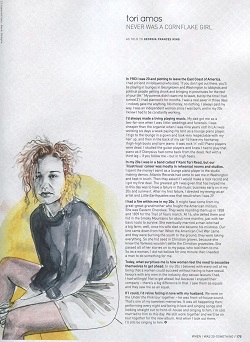|

songs | interviews | photos | tours | boots | press releases | timeline
Frankie magazine (Australia)
December 2012
tori amos
NEVER WAS A CORNFLAKE GIRL.
As told to Georgia Frances King
In 1983 I was 20 and plotting to leave the East Coast of America. I had a friend in Hollywood who said, "If you don't get out there, you'll be playing in lounges in Georgetown and Washington to lobbyists and political people getting drunk and bringing in prostitutes for the rest of your life." My parents didn't want me to leave, but by the time I had turned 21 I had planned it for months. I was a real saver in those days -- nobody gave me anything. No money, no nothing. I always paid my way. I was an independent woman since I was born, and in my 20s I knew I had to be constantly working.
I'd always made a living playing music. My dad got me as a two-for-one when I was little: weddings and funerals. I was cheaper than the organist when I was nine years old! In LA I was working six days a week paying my rent as a lounge piano player. I'd go to the lounge in a gown and look very respectable with my hair up, and then in the back of my car I'd have the hairspray, thigh-high boots and torn jeans; it was rock 'n' roll! Piano players were dead. I studied the guitar players and knew I had to play that piano as if Dionysus had come back from the dead. Noth with a third leg -- if you follow me -- but in high heels.
In my 20s I was in a band called Y Kant Tori Read, but our "illustrious" career was mostly in rehearsal rooms and studios. I spent the money I earnt as a lounge piano player in the studio making demos. Atlantic Records had come to see me in Washington and kept in touch. Then they asked if I would make a rick record and I got my first deal. The greatest gift I was given that has helped me to this day was to have a failure in the music business early on in my 20s and survive it. After my first failure, I directed my energy as an artist and Little Earthquakes was the result when I was 29.
I had a fire within me in my 20s. It might have come from my great-great-grandmother who fought the American military. She was Eastern Cherokee. They were rounding them up in 1838 and 1839 for the Trail of Tears march. At 16, she defied them and hid in the Smokey Mountains for about nine months, just with her basic tools to survive. She eventually married a man who had a big farm; well, once his wife died she became his mistress. Our line came down from her. When the American Civil War came and they were burning the south to the ground, they were taking everything. So she hid seed in Christian graves, because she knew the Yankees wouldn't defile the Christian gravesites. She passed all of her stories on to my papa, who told them to me. So as a woman, I did not believe for one minute that I needed a man to do something for me.
Today, what surprises me is how women feel the need to sexualize themselves to get ahead. In my 20s I believed with every cell of my being that a woman could succeed without having to have sexual favours with any men in the industry. Any sexual favours I had, I had willingly! Not to get ahead, but because I enjoyed their company -- there's a big difference in that. I saw them as equals and they saw me as an equal.
If I could, I'd relive falling in love with my husband. We were on the Under the Pink tour together -- he was front-of-house sound. That's one of my sweetest memories. It was all happening then: performing every night and being in love and singing songs and looking straight out to front-of-house and singing to him. I'm still married to him to this day. We still work together and we'll be on tour together for the new album. And when I look out there, I'll still be singing to him.
original article

t o r i p h o r i a
tori amos digital archive
yessaid.com
|